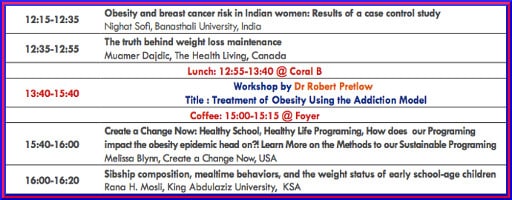
Last month at the Global Conference on Obesity Treatment and Weight Management, Dr. Pretlow conducted a two-hour workshop on “Treatment of Obesity Using the Addiction Model.” He says:
I will be conducting a similar workshop on Tuesday for a streaming conference out of the UK. Our 90-min symposium submission on this topic was accepted by the World Congress of Psychiatry in Berlin in October. There appears to be significant new interest in this topic.
This last sentence is an understatement. The idea of treating obesity by using the addiction model is catching on. At this same gathering, speakers delved into such related topics as pedagogy; lifestyle management; binge eating; weight loss maintenance; mental programming; eating behaviors; hormones; diabetes; the gut microbiome; emotionally struggling adolescents; the brain; bariatric surgery; and more. Directly or tangentially, many areas of expertise impinge on the territory of compulsive overeating.
The presentation
The “Treatment of Obesity Using the Addiction Model” presentation reminds the audience of the Early Bird Diabetes study, one of the first to suspect that “Physical inactivity appears to be the result of fatness rather than its cause.” Dr. Pretlow mentions again that 68% of his survey respondents said they have overdosed on healthy eating information.
Treatments that work are bariatric surgery and residential immersion programs, aka rehab centers. Both are expensive and time-consuming; neither can guarantee sustained long-term success. Evidence accumulates, indicating that the overeating that leads to obesity is an addictive process.
Slide 14 begins with the story of two groups of genetically identical rats. When researchers placed hyperpalatable foods on the far side of an electrified floor, the obese rats who were already hooked on the stuff went right ahead and endured the pain to get it. (We have all known people like that.)
“Something had changed in these obese rats, presumably something in their brains.” But the ones raised on plain rat chow did not volunteer for shocked feet, not even for a high-pleasure reward. Many of us want to become people like that.
But other rat studies showed other different and interesting things. Dr. Pretlow suggests that the substance might be beside the point, as overeating addiction might just boil down to the two components, comfort eating (sensory addiction) and nervous eating (motor addiction). He talks about body hunger versus brain hunger. Brain hunger is an emotion, an illusion, a promise of pain relief that can only be kept in the very short term, and is always broken in the long term.
Your responses and feedback are welcome!
Source: “Global Conference on Obesity Treatment and Weight Management,” ScientOnline.org, 03/20/17
Source: “Treatment of Obesity Using the Addiction Model,” Weigh2Rock.com, March 2017
Image by Global Conference on Obesity Treatment and Weight Management

 FAQs and Media Requests:
FAQs and Media Requests: 











